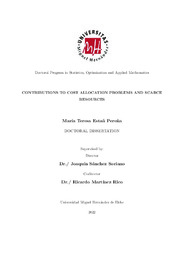Por favor, use este identificador para citar o enlazar este ítem:
https://hdl.handle.net/11000/28955Registro completo de metadatos
| Campo DC | Valor | Lengua/Idioma |
|---|---|---|
| dc.contributor.advisor | Sánchez Soriano, Joaquín | - |
| dc.contributor.advisor | Martinez, Ricardo | - |
| dc.contributor.author | Estañ Pereña, Maria Teresa | - |
| dc.contributor.other | Departamentos de la UMH::Estadística, Matemáticas e Informática | es_ES |
| dc.date.accessioned | 2023-03-06T12:56:14Z | - |
| dc.date.available | 2023-03-06T12:56:14Z | - |
| dc.date.created | 2022-06-13 | - |
| dc.identifier.uri | https://hdl.handle.net/11000/28955 | - |
| dc.description.abstract | Esta tesis est a enmarcada dentro de la Teor a de Juegos, disciplina Matem atica de gran relevancia en Econom a por su alto grado de aplicabilidad en situaciones reales, como por ejemplo las derivadas del reparto de costes y/o bene cios o la distribuci on de recursos escasos, entre muchas otras. Una de las grandes referencias que da origen a esta rama de las Matem aticas es el libro "Theory of Games and Economic Behavior" de Oskar Morgenstern y John Von Neumann (Morgenstern and Von Neumann (1953)) al cual contribuy o de manera seminal con el desarrollo de los juegos m ultiples el Premio Nobel John Nash. El objetivo de esta tesis no es analizar c omo los individuos o agentes del juego toman sus decisiones sino proporcionar soluciones a los problemas planteados empleando procedimientos matem aticos que nos permiten dise~nar diferentes mecanismos o reglas que satisfacen uno o un conjunto de propiedades, tambi en llamadas axiomas, que caracterizan cada una de las reglas planteadas. | es_ES |
| dc.description.abstract | This thesis is framed within Game Theory, a Mathematical discipline of great relevance in Economics due to its high degree of applicability in real situations, such as for example, those derived from the allocation of costs and/or bene ts or the distribution of scarce resources, among others. One of the great references that gives rise to this branch of Mathematics is the book "Theory of Games and Economic Behavior" by Oskar Morgenstern and John Von Neumann (Morgenstern and Von Neumann (1953)) to which the Nobel Laureate John Nash contributed with the development of multiple games. The objective of this thesis is not to analyze how the individuals or agents of the game make their decisions, otherwise to provide solutions to the problems proposed using mathematical procedures that allow us to design di erent mechanisms or rules that satisfy one or a set of properties, also called axioms, that characterize each one of the proposed rules. | es_ES |
| dc.format | application/pdf | es_ES |
| dc.format.extent | 160 | es_ES |
| dc.language.iso | eng | es_ES |
| dc.publisher | Universidad Miguel Hernández de Elche | es_ES |
| dc.rights | info:eu-repo/semantics/openAccess | es_ES |
| dc.rights.uri | http://creativecommons.org/licenses/by-nc-nd/4.0/ | * |
| dc.subject | Teoría de juegos | es_ES |
| dc.subject.other | CDU::5 - Ciencias puras y naturales::51 - Matemáticas | es_ES |
| dc.title | Contributions to cost allocation problems and scarce resources | es_ES |
| dc.type | info:eu-repo/semantics/doctoralThesis | es_ES |

Ver/Abrir:
Estañ Pereña, Mª Teresa.pdf
8,24 MB
Adobe PDF
Compartir:
 La licencia se describe como: Atribución-NonComercial-NoDerivada 4.0 Internacional.
La licencia se describe como: Atribución-NonComercial-NoDerivada 4.0 Internacional.
.png)